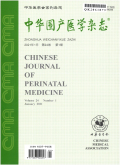山东省多中心极/超低出生体重儿入院低体温现状调查
Hypothermia on admission in both very low and extremely low birth weight infants in Shandong Province:a multicenter survey
摘要目的 调查山东省极低出生体重儿(very low birth weight infant, VLBWI)和超低出生体重儿(extremely low birth weight infant, ELBWI)入院低体温现状,为促进新生儿重症监护病房(neonatal intensive care unit, NICU)低体温质量改进提供临床依据. 方法 采用回顾性问卷调查方式,调查2017年1月1日至12月31日,山东省15个地(市)24家三级甲等医院NICU收治的VLBWI/ELBWI入院体温分布情况、入院体温测量部位和方法,以及20项预防低体温措施实施情况.采用描述性分析及Spearman分析进行统计学分析. 结果 纳入的24家医院中综合性医院16家,妇幼保健院8家;新生儿科平均床位数59张,NICU平均床位数40张;NICU共收治新生儿50 445例,其中早产儿17 312例,占34.3%;纳入研究的VLBWI/ELBWI共2 693例,占NICU收治早产儿总数的15.6%(2 693/17 312),其中VLBWI 2 279例,ELBWI 414例.24家NICU收治的VLBWI/ELBWI入院低体温发生率为89.3%(2 406/2 693),其中VLBWI入院低体温发生率为89.3%(2 035/2 279),ELBWI为89.6%(371/414).24家NICU实施预防低体温措施项目数[M(P25~P75)]为10.5(8.3~14.0)项.新生儿的绒帽放于辐射保暖台预热,包裹新生儿需要的塑料薄膜(头、身体、下肢各1 张),放置预热的毯子上迅速称重,不擦干全身迅速用塑料薄膜分别包裹新生儿的头部、躯干及下肢,将预热的绒帽戴好,生后10 min于产房测量记录体温,转运暖箱转运到NICU,记录入NICU体温≥36.5 ℃的时间,早产儿入NICU低体温月报表,实施早产儿入NICU低体温质量改进计划-执行-研究-再执行这几个项目开展的NICU数较少,不足一半.入院体温测量大多是采用水银体温计测量腋下温度,占79.2%(19/24);大多是护士陪同用水银体温计测量腋下温度5 min,占45.8%(11/24).相关分析显示,低体温预防措施实施项目数与入院低体温发生率呈负相关(r=-0.262,P<0.05). 结论 VLBWI/ELBWI入院低体温发生率较高,切实实施预防低体温的措施,促进NICU入院低体温质量改进,有望降低VLBWI/ELBWI入院低体温的发生率.
更多相关知识
abstractsObjective To study the current situation of admission hypothermia in very low birth weight infants (VLBWI) and extremely low birth weight infants (ELBWI) in Shandong province and to provide clinical evidence for quality improvement in reducing the incidence of admission hypothermia in neonatal intensive care units (NICU). Methods A retrospective questionnaire survey was conducted in VLBWI/ELBWI admitted to NICU of 24 grade A tertiary hospitals in Shandong province from January 1 to December 31, 2017 and information on distribution and measuring methods of temperature on admission, and the implementation of 20 measures preventing hypothermia were collected. Descriptive statistical methods and Spearman analysis were used for statistical analysis. Results The 24 recruited hospitals included 16 general hospitals and eight maternal and child healthcare hospitals with an average number of beds in Neonatology Department and NICU of 59 and 40, respectively. A total of 50 445 newborns had been admitted to NICU, including 17 312 (34.3%) premature infants, among which 2 693 (15.6%, 2 693/17 312) were enrolled in this study, consisting of 2 279 VLBWI and 414 ELBWI. The overall incidence of admission hypothermia in VLBWI/ELBWI was 89.3% (2 406/2 693), and the figures for VLBWI and ELBWI were 89.3% (2 035/2 279) and 89.6% (371/414), respectively. The median number [M (P25-P75)] of the measures implemented to prevent hypothermia in the 24 NICU was 10.5 (8.3-14.0). Only less than 50% of the 24 NICU carried out the following measures: pre-warmed hat on the radiant warmer, wrapping newborns in plastic film (three pieces for head, body and lower limbs respectively), quick weighing after the newborns being placed in a pre-warmed blanket, wrapping newborns (head, body and lower limbs) in plastic film without drying, putting on a pre-warmed hat, measuring and recording body temperature 10 min after birth, transferring newborns from delivery room to NICU in a transport incubator, recording the time when body temperature ≥36.5 ℃, monthly reporting chart on hypothermia in preterm infants on admission to NICU, implementing the quality improvement project to reduce hypothermia in preterm infants on admission to NICU. Axillary temperature on admission tested with mercury thermometer was the most common method used in the 24 NICU [79.2% (19/24)]; mostly was measured under the arm for 5 min accompanying with nurses using mercury thermometer [45.8% (11/24)]. There was a negative correlation between the incidence of admission hypothermia and the number of quality improvement measures implemented to prevent hypothermia (r=-0.262, P<0.05). Conclusions VLBWI/ELBWI have a higher risk of admission hypothermia in NICU, which might be reduced through effective preventions and quality improvement measures.[Key words] Infant, very low birth weight; Infant, extremely low birth weight; Hypothermia;Multicenter study
More相关知识
- 浏览227
- 被引25
- 下载710


相似文献
- 中文期刊
- 外文期刊
- 学位论文
- 会议论文



 换一批
换一批 换一批
换一批



